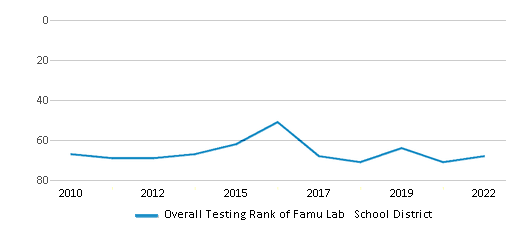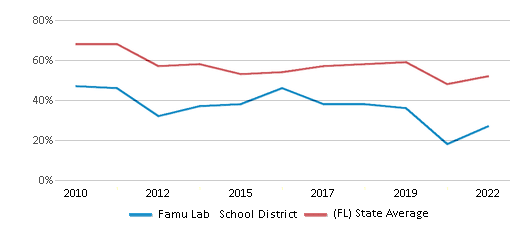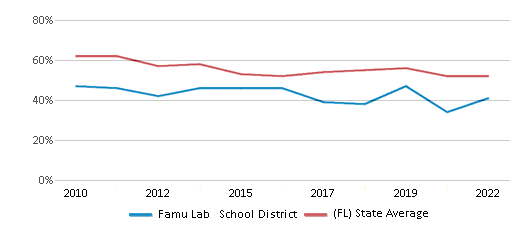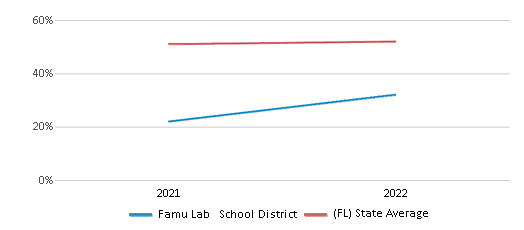For the 2025 school year, there are 2 public schools serving 569 students in Famu Lab School District. This district's average testing ranking is 1/10, which is in the bottom 50% of public schools in Florida.
Public Schools in Famu Lab School District have an average math proficiency score of 27% (versus the Florida public school average of 53%), and reading proficiency score of 41% (versus the 52% statewide average).
Minority enrollment is 100% of the student body (majority Black), which is more than the Florida public school average of 66% (majority Hispanic).
Overview
This School District
This State (FL)
# Schools
2 Schools
4,272 Schools
# Students
569 Students
2,871,617 Students
# Teachers
27 Teachers
155,327 Teachers
Student : Teacher Ratio
21:1
21:1
District Rank
Famu Lab School District, which is ranked within the bottom 50% of all 73 school districts in Florida (based off of combined math and reading proficiency testing data) for the 2021-2022 school year.
The school district's graduation rate of 90% has increased from 80% over five school years.
Overall District Rank
#68 out of 73 school districts
(Bottom 50%)
(Bottom 50%)

Math Test Scores (% Proficient)
27%
52%

Reading/Language Arts Test Scores (% Proficient)
41%
52%

Science Test Scores (% Proficient)
30-34%
52%

Graduation Rate
≥90%
87%

Students by Ethnicity:
Diversity Score
0.12
0.70
# American Indian Students
n/a
7,127 Students
% American Indian Students
n/a
n/a
# Asian Students
n/a
82,684 Students
% Asian Students
n/a
3%
# Hispanic Students
32 Students
1,067,518 Students
% Hispanic Students
6%
37%
# Black Students
533 Students
599,852 Students
% Black Students
94%
21%
# White Students
2 Students
988,678 Students
% White Students
n/a
35%
# Hawaiian Students
n/a
4,961 Students
% Hawaiian Students
n/a
n/a
# Two or more races Students
2 Students
120,797 Students
% of Two or more races Students
n/a
4%
Students by Grade:
# Students in PK Grade:
-
65,492
# Students in K Grade:
38
195,805
# Students in 1st Grade:
52
204,872
# Students in 2nd Grade:
35
211,537
# Students in 3rd Grade:
42
217,908
# Students in 4th Grade:
34
214,300
# Students in 5th Grade:
34
205,644
# Students in 6th Grade:
55
210,929
# Students in 7th Grade:
41
223,117
# Students in 8th Grade:
60
218,377
# Students in 9th Grade:
44
233,011
# Students in 10th Grade:
44
236,046
# Students in 11th Grade:
56
221,011
# Students in 12th Grade:
34
213,568
# Ungraded Students:
-
-
Best Famu Lab School District Public Schools (2025)
School
(Math and Reading Proficiency)
(Math and Reading Proficiency)
Location
Grades
Students
Rank: #11.
Florida A&m University Developmental Research School
(Math: 27% | Reading: 41%)
Rank:
Rank:
2/
Bottom 50%10
400 W Orange Ave
Tallahassee, FL 32307
(850) 412-5866
Tallahassee, FL 32307
(850) 412-5866
Grades: K-12
| 569 students
Rank: n/an/a
400 W Orange Ave
Tallahassee, FL 32307
(850) 412-5866
Tallahassee, FL 32307
(850) 412-5866
Grades: K-12
| n/a students
Frequently Asked Questions
How many schools belong to Famu Lab School District?
Famu Lab School District manages 2 public schools serving 569 students.
What is the rank of Famu Lab School District?
Famu Lab School District is ranked #67 out of 73 school districts in Florida (bottom 50%) based off of combined math and reading proficiency testing data for the 2021-2022 school year.
What is the racial composition of students in Famu Lab School District?
94% of Famu Lab School District students are Black, and 6% of students are Hispanic.
What is the student/teacher ratio of Famu Lab School District?
Famu Lab School District has a student/teacher ratio of 21:1, which is higher than the Florida state average of 18:1.
Recent Articles

What Is A Charter School?
Explore the world of charter schools in this comprehensive guide. Learn about their history, how they operate, and the pros and cons of this educational innovation. Discover key facts about charter schools, including admission policies, demographics, and funding, as well as what to look for when considering a charter school for your child.

10 Reasons Why High School Sports Benefit Students
Discover the 10 compelling reasons why high school sports are beneficial for students. This comprehensive article explores how athletics enhance academic performance, foster personal growth, and develop crucial life skills. From improved fitness and time management to leadership development and community representation, learn why participating in high school sports can be a game-changer for students' overall success and well-being.

February 05, 2025
Understanding the U.S. Department of Education: Structure, Impact, and EvolutionWe explore how the Department of Education shapes American education, from its cabinet-level leadership to its impact on millions of students, written for general audiences seeking clarity on this vital institution.





